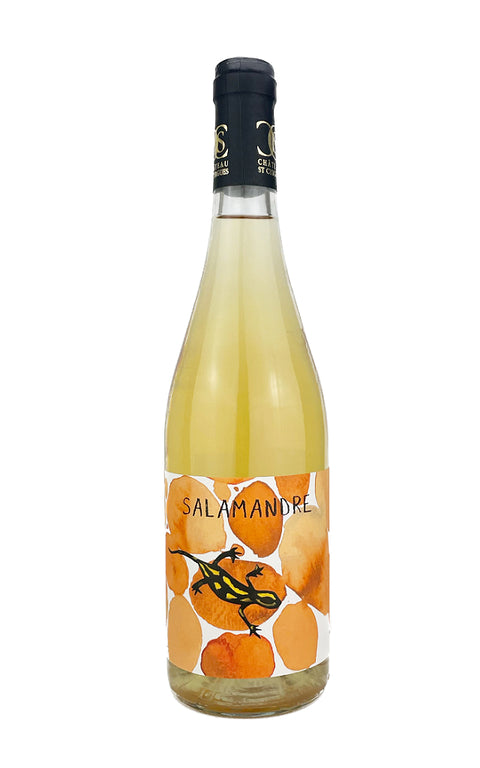
Salamandre Orange, Chateau de Saint Cyrgues
It's a great and gentle entry-level orange wine. Ten days on skins, this is a French organic orange wine with floral notes and flavours of peach and summer fruits and a little bit of grip. Ideal for sunny afternoons or sharing with friends.
- Origin: Nimes, France
- Producer: Chateau de Saint Cyrgues
- Vintage: 2024
- Grape varieties: Grenache Blanc
- Food pairings: Spicy dishes (Moroccan, Spanish, Indian), fish dishes, cheese
- Bottle size: 75cl
- ABV: 12.5%
Flavour Profile
Fresh and aromatic, this wine opens with notes of orange blossom, ripe peach, and citrus zest. On the palate, expect juicy stone fruits like white peach and apricot, a twist of orange peel, and just the right amount of tannic grip from its 10-day skin contact. It’s textural but not overpowering, finishing dry and gently savoury, with a mouthwatering edge that keeps you coming back.
About the Château de Saint Cyrgues winery
Based near Nîmes in southern France, Château de Saint Cyrgues sits on ancient vineyard land with roots tracing back to the 1600s. Today, it’s run by father and son team Jean-Pierre and Loïc, who focus on organic, expressive wines that celebrate their sun-drenched Mediterranean terroir. Certified organic since 2016, the estate is all about honest winemaking with a light touch: just grapes, soil, and time.
About Orange wine
Orange wine is made by fermenting white grapes on their skins, a method more commonly used for red wines. The result? A wine with extra colour, texture, and flavour depth. You’ll often find notes of dried fruit, herbs, or spice, and a bit of tannin that gives it structure.
How to pair it
This is a super versatile food wine. Pair it with mezze spreads, grilled halloumi, herby chicken, or roasted squash. It’s also great with spiced dishes, fermented foods, or soft cheeses like brie and burrata. Basically, it's great for a picnic or BBQ.
Delivery and returns
What are the delivery options?
- Local Delivery (E17, E10 postcodes): Free over £35
- Click & Collect: Free
- Standard Delivery: £8.95 (Free over £80)
Where can I get my order delivered?
- Local Delivery is available within London E17 and E10 postcodes.
- Click & Collect orders can be picked up at our shop located at 149 Forest Rd, E17 6HE.
When will my order arrive?
- Next day service is available for local and standard deliveries (subject to availability).
- All orders placed by midnight will be dispatched the next working day.
Why do I need to pay for returns?
- If returning your order by mail, the buyer is responsible for the return shipping cost.
- You may return your purchase within 30 days if you are unsatisfied for any reason.
How do I return my order?
- Free returns are available if you return your order to our store.
- If returning by mail, you may ship back the item using the carrier of your choice.
Frequently Asked Questions
Why is orange wine so expensive?
Orange wine can sometimes be pricier due to the way it’s made. It involves longer skin contact, which means more time in the cellar and often more manual work. Many orange wines also come from small, low-intervention producers who use organic or biodynamic methods, which adds to the cost but also the quality. You're not just paying for the wine, but for a thoughtful, craft-driven process.
How should you drink orange wine?
Think of orange wine as sitting between white and red. Drink it slightly chilled, but not fridge-cold. Around 10–14°C is ideal. That allows the aromatics and texture to really shine. You can serve it in a white wine or universal glass, and don’t be afraid to let it breathe a little. Some orange wines even open up beautifully over a few hours.
Should I keep orange wine in the fridge?
Yes, but with a caveat. If it's already open, definitely keep it in the fridge with a cork or stopper, it can last a few days, sometimes longer. For unopened bottles, a cool, dark place (like a wine rack away from heat) is usually best. If your fridge is your only option, it’s fine short term, but try to take it out about 15–20 minutes before serving.
What is the difference between Northern and Southern Rhône?
The Northern Rhône is cooler and focuses mostly on Syrah for reds and Viognier, Marsanne, and Roussanne for whites. It’s known for more structured, elegant wines. The Southern Rhône is warmer and the region produces more blends, think Grenache, Syrah, Mourvèdre for reds and Grenache Blanc, Clairette, Bourboulenc for whites. The wines here tend to be bolder, fruitier, and more rustic.
What is a Grenache Blanc wine?
Grenache Blanc is the white-skinned cousin of red Grenache. It makes wines that are full-bodied, round, and aromatic, often with notes of pear, citrus, herbs, and sometimes a touch of almond or white flowers. You’ll find it in the South of France, Spain, and in some New World natural wine projects. It can be fresh and zippy or richer and textured, depending on how it's made.